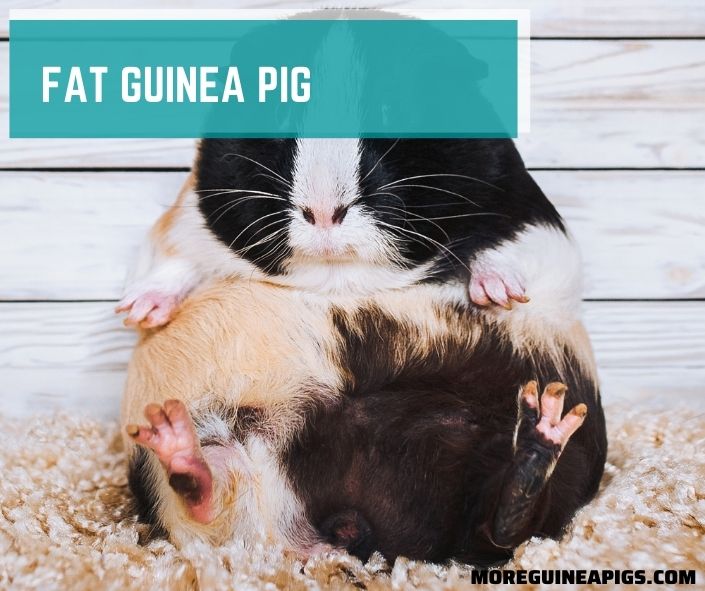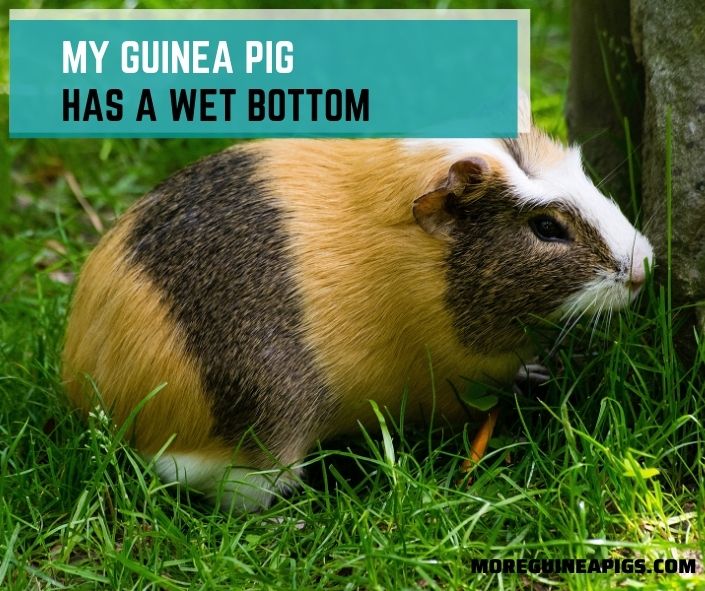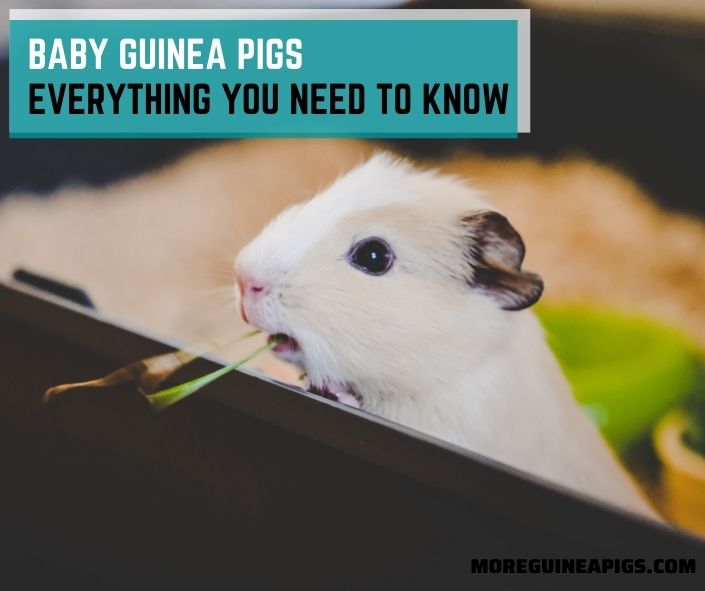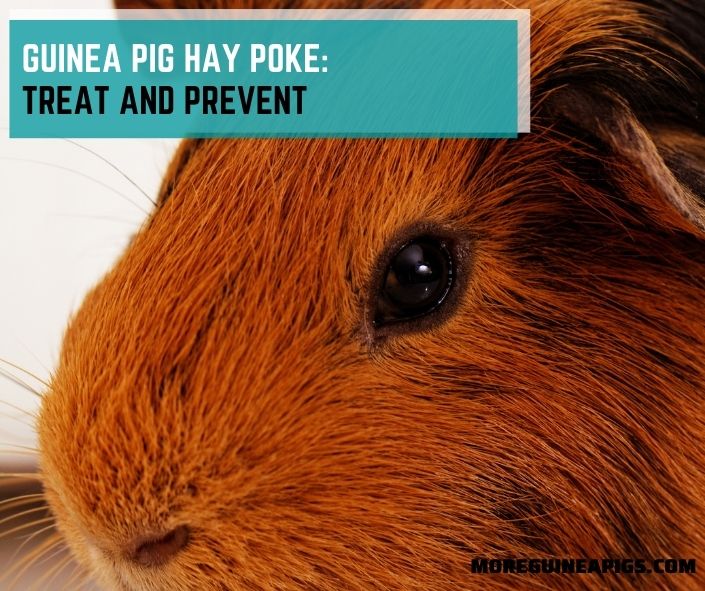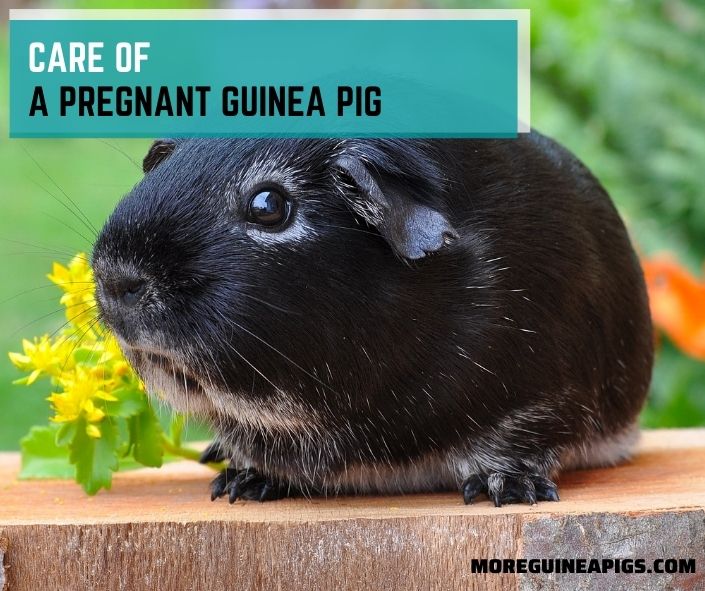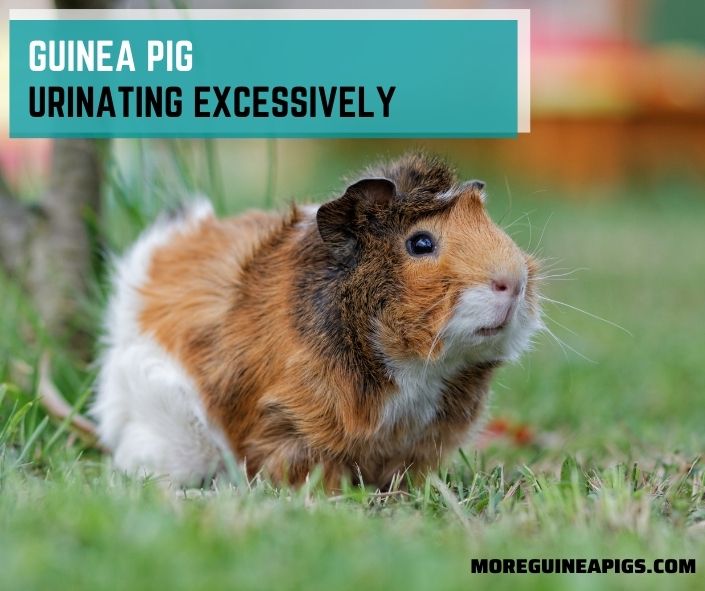Fat Guinea Pig (Causes & Dangers of Health)
Guinea pigs are one of the most adorable and fascinating animals you will fall in love with once you set your eyes on them.
They are not only adorable, but they are also quite intelligent, have docile temperaments, making them suitable for families with kids and new pet owners.
Generally, guinea pig diets have little fat, but you will be surprised to hear that they can become overweight.
Guinea pigs can gain weight if they are fed too many treats, don’t have enough space to exercise, or suffer from medical issues like a tumor.
As a loving guinea pig owner, you may be wondering if your guinea pig is overweight.
This is why we have helped compile everything you need to know about fat guinea pigs, from how to determine if your guinea pig is overweight to ways of preventing this.
How Much Should Your Guinea Pig Weigh?

Guinea pigs usually weigh about 100g at birth, and they will reach adult weight around eight months. Generally, male guinea pigs are quite heavier than female guinea pigs, but there are some cases where females can be heavier.
The weight of guinea pigs usually varies from one species to another at the adult stage. However, a healthy male guinea pig can weigh around 910-1360g (2-3lb). On the other hand, a healthy female guinea pig weighs between 608-1200g (1.5-2.6lb).
This shows that a healthy adult guinea pig is usually between 700-1200g (1.5-2.6lbs). Anything above or below may indicate that your guinea pig is overweight or underweight.
How Do You Know If Your Guinea Pig Is Fat
Guinea pigs are naturally round and fluffy, making it quite hard to determine when they are fat or not. However, an overweight guinea pig doesn’t usually run or play very well because they get tired very quickly.
You can also track your guinea pig weight using a kitchen scale.
Some of the signs that indicate that your guinea pig is fat are:
- They will have 15-20% above their body weight
- You will find a fat deposit in various locations.
- You will not see their feet.
- You will not feel their ribs, spine, and hips, or you will need to apply mild pressure to feel it.
Weighing

The best way to determine your guinea pig’s weight is by weighing them regularly to help track their weight. Weighing them regularly will help to spot when your guinea pig is gaining or losing weight.
You can opt for a gram scale as it helps to detect smaller increments together.
The average weight of a healthy male guinea pig is around 900-1200g, while a female guinea pig weighs around 700-900g.
Guinea Pig-Size-O-Meter
Apart from weighing your guinea pig, another great way to determine if they are overweight is by observing your piggies. You can check out their movement, activity level, and so on to determine if they have excess weight.
A great tool to provide insight into whether your guinea pig is overweight is by using the Guinea Pig-Size-O-Meter made by the Pet Food Manufacturers’ Association.
The infographic will give you an insight on what you can check to determine if they are overweight.
You can print out the chart here to serve as a guide.
Hand Feel
You can hand feel a guinea pig to determine if it is fat or not. An overweight guinea pig usually has a potbelly, and you may not see this when they are standing. You can gently use your hand to feel their body gently.
You will not be able to feel their ribs, spines, or hips with your hand if your guinea pig is overweight.
Distinguish Between Pregnant Guinea Pig and Fat
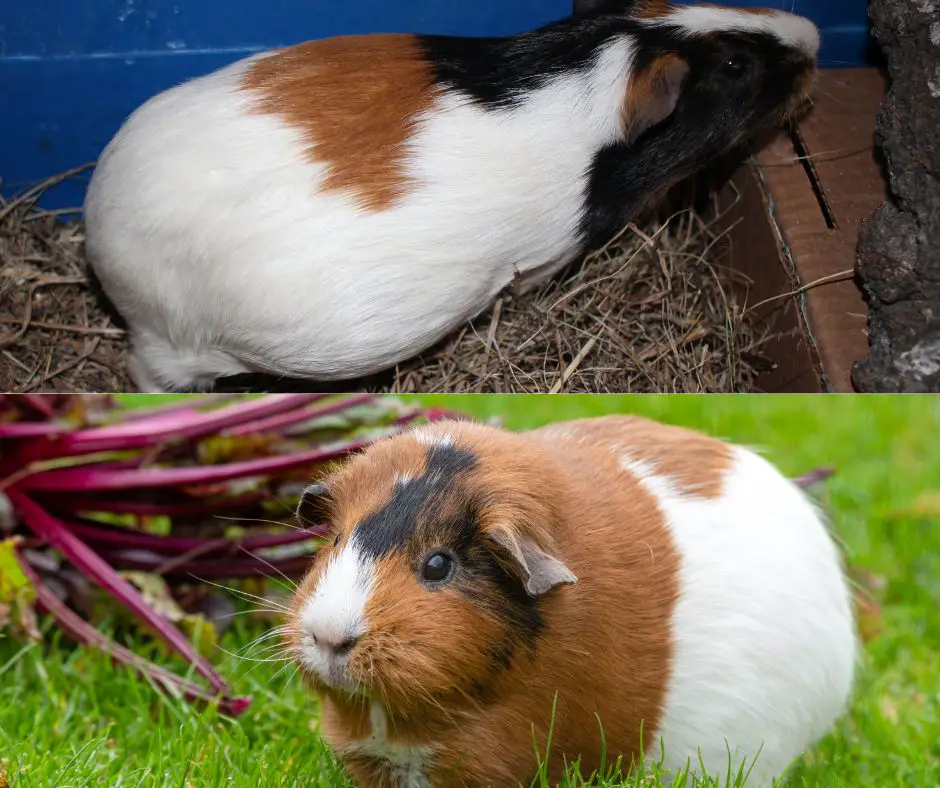
It can be hard to distinguish whether an adult female guinea pig is pregnant or getting fat. This is because a female guinea pig will start to gain weight just like a fat guinea pig.
Another thing is that a pregnant guinea pig will increase their food intake during the pregnancy period to nourish the baby inside her.
Some of the ways that you can use to determine if your guinea pig is pregnant are stated below.
A quick way to determine whether it is pregnant is its size. Pregnant guinea pig’s sides usually curve outward and will continue to stretch as the pregnancy continues.
If you cannot see this, you can compare a potentially pregnant female to a female that is not pregnant to see this.
The second thing is to be on the lookout for the way your guinea pig wall or run. You will notice that they walk or run awkwardly to accommodate their new weight. An active female guinea pig may also stop being active once pregnant.
You can also determine if a guinea pig is pregnant by hand feeling it. You are going to feel lumps under your fingers if you use your finger to examine her sides and stomach gently.
However, it is not all pregnant guinea pigs that love to be touched, and if that is the case, you can leave them alone.
Another way to get a definite answer to whether your guinea pig is pregnant or fat is to consult with the vet.
Why Are Your Guinea Pigs So Fat?
A guinea pig becoming overweight is quite dangerous, just like when it is underweight. Some of the reasons why your guinea pigs can become so fat are stated below:
- By overfeeding your guinea pig with too many treats.
- Not feeding your guinea pig with the right food such as hay, pellets, vitamin c, etc.
- There is not enough space for your guinea pig to exercise.
Health Risks Of Overweight Guinea Pig
A fat guinea pig is usually prone to a wide range of health problems than a healthy guinea pig.
Once your guinea pigs become overweight, it usually has physical limitations like joint issues, difficulty grooming, reduced activity, etc., leading to a more severe health condition that can be fatal if not addressed.
For instance, a fat guinea pig unable to groom themselves properly can get infested by flystrike. Furthermore, obesity can also cause strain in your guinea pig’s respiratory and cardiovascular systems and on their joints, leading to arthritis.
Some of the common health issues that an overweight guinea pig can have are:
- Diabetes
- Back pain
- Heart problems
- Pododermatitis
- Digestive problems
- Urine scald
- Flystrike
- Osteoporosis
- Ketosis

How To Help Your Guinea Pig Lose Weight
The first thing to do when your guinea pig becomes overweight is to contact your vet to help determine the best way to deal with this. However, there are two ways that you can use to help your guinea pig to lose weight, and they are stated below.
Increase Amount of Energy Used During Exercise
A great way to help your guinea pig lose weight is by increasing the amount of time they exercise. You can allow your overweight guinea pig to roam around a safe room under your supervision daily.
You can also encourage your overweight guinea pig to exercise by providing toys and games for them to play with them.
Also read: 9 Best Guinea Pig Toys
Decrease The Number Of Calories In Their Diet
The second way to help your guinea pig reduce weight is to put it on a diet to reduce their calorie intake. You can reduce the number of pellets, fruits, and vegetables that you feed them to only a few times per week.
Note
Putting a guinea pig on a diet should be done gradually. The best way to start cutting their die is to reduce the fruits or treats you give them.
You should try to consult your vet before you try to cut down or change their pelleted food as suddenly changing pelleted food can lead to gastrointestinal upset or even make them stop eating.
Furthermore, a guinea pig can become overweight due to several reasons such as age, pregnancy, and other health issues. You can first consult with your vet to confirm that your guinea pig is losing weight before cutting down its diet.
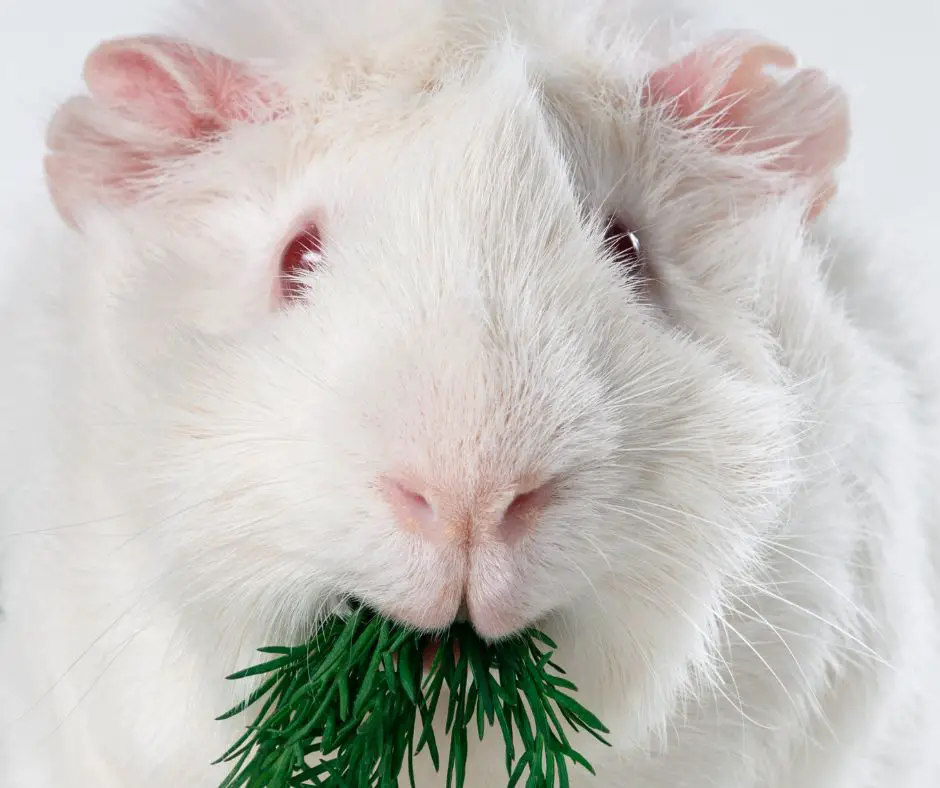
How To Control Guinea Pig Weight
The two main reasons a guinea pig can become overweight are when you feed them with too many treats or there is little space for them to roam and exercise.
Some of the ways guinea pig owners can use to control and prevent guinea pigs from being overweight are stated below.
Feed Your Guinea Pig The Right Food
The best way to prevent your guinea pig from being overweight is by feeding them the right food. You should ensure that hay is the major part of their diet as it contains all the main nutrients your cavy needs and aids healthy digestion.
You can then incorporate high-quality pellets, vegetables, and fresh fruit into their diet to provide other essential nutrients that you need. Some of the foods that you should avoid feeding your guinea pigs are:
- Nuts
- Dairy products
- Pasta
- Chocolate
- Avocado
- Sugar
- Peas
- Sweets
- Dried beans
- Cereals
- Biscuits, etc.

Also read:
Encourage An Active Lifestyle
Your guinea pig can become overweight if bored and does not move around their cage. A great way to ensure that your guinea pig does not become overweight is to ensure they stay active.
Guinea pig owners can encourage an active lifestyle in their pets by providing enough space with stimulating toys, like tunnels and balls, to keep them active. Another thing is to keep your guinea pig in groups or pairs to help keep them active.
Also read: 7 Fun Tricks You Can Train Your Guinea Pig
Regular Monitoring
Generally, a pet’s body condition can change over time, and owners may not notice this.
This is why you must monitor your guinea pig regularly to help detect signs that they are getting overweight. You can access them weekly or monthly to determine when they gain weight.
This will then help owners to curb weight gain before it becomes prominent. A gram scale is a great tool for determining your guinea pig’s weight, which will help notice any small increments in their weight and give you insight or what to expect.
Also read: Complete Guinea Pig Care Guide
Amakunft Small Animals C&C Cage Tent
Summary
Although guinea pigs are small-sized creatures, they can also become overweight. This can happen if they don’t have enough space to exercise or feed them the wrong food.
The bad news is that obesity can cause serious health issues for your guinea pig, and it is best to avoid this as much as possible.
